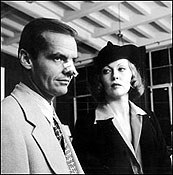101 Greatest Screenplays
3Chinatown
Written by Robert Towne

Some facts about the writing of the film:
- Robert Towne was born and reared in the Los Angeles area. He studied philosophy at Pomona College.
- Robert Towne based his famous exchange (Evelyn: "What did you do in Chinatown?" Jake: "As little as possible.") on a joke told to him by an LAPD officer friend. IMDB
- Jake Gittes was named after Jack Nicholson's friend, producer Harry Gittes. IMDB
- Robert Towne was offered $175,000 by Paramount to write The Great Gatsby in 1973. Instead he pushed to write a pet project of his, Chinatown, for the bargain price of $25,000. bbc.uk
- "The ending that I had originally conceived never ended in Chinatown. I had always felt it was really pushing the metaphor to end up in the physical location. There was one horrible day when everybody got crazy just about two weeks before shooting and somebody said, 'My God, there's no scene in Chinatown, and it's called Chinatown!'" AFI interview with Robert Towne
- "Originally, I had Evelyn [Mulwray] kill her father, and I had the detective try and stop her. In the first and second drafts he got the daughter out of the country. It also ended in a funny way: you knew that Evelyn was going to have to stand trial and you knew that she wasn't going to be able to tell why she did it. But it was bittersweet in the sense that one person, at least, wasn't tainted the child." AFI interview with Robert Towne
 "With Chinatown, I originally thought I'd do a detective movie. That was all, initially. But then, I didn't want to do just any detective movie. Once you say you want to do a detective movie, you start thinking about what crime is to you, what it really means, what you think is really a horrible crime and what angers you. So I thought, I don't want to do a crime movie about the kind of things that don't anger me. I wanted to do something that really infuriated me. The destruction of the land and that community was something that I thought was really hideous. It was doubly significant because it was the way Los Angeles was formed, really." AFI interview with Robert Towne
"With Chinatown, I originally thought I'd do a detective movie. That was all, initially. But then, I didn't want to do just any detective movie. Once you say you want to do a detective movie, you start thinking about what crime is to you, what it really means, what you think is really a horrible crime and what angers you. So I thought, I don't want to do a crime movie about the kind of things that don't anger me. I wanted to do something that really infuriated me. The destruction of the land and that community was something that I thought was really hideous. It was doubly significant because it was the way Los Angeles was formed, really." AFI interview with Robert Towne
- "In the case of Chinatown, I wrote at least 20 different step outlines long, long step outlines, that got me about 70 percent of the way through it. Finally, after the 20th I said, 'Well, this is far enough. I know where it's going to end. Now, I'll just devote myself to the problem of writing it.'" AFI interview with Robert Towne
- "Chinatown is a pretty good metaphor for the futility of the good intentions. [Police officers in the film] are told to do as little as possible in Chinatown in the way of law enforcement, because you never know whether you're helping to avert a crime or helping to commit one." AFI interview with Robert Towne
- "We [Towne and Polanski] took the script and broke it down into one-sentence summations of each scene. Then we took a scissors and cut those little scenes and pasted them on the door of the study at his house where we were working. And the game was to shift those things around until we got them in an order that worked." Los Angeles Times, July 8, 1999
- "It seems like it took me forever to write at least 10 months. It was difficult; all screenplays that are highly structured are difficult you are not relying on the momentum of some picaresque tale to take you wherever you want to go. Always the hardest part of any story is to figure out the point of entry where your story begins." The Hollywood Reporter, July 2002
- For the most part, the final screenplay was shot almost exactly as it was written. "Once Roman and I agreed on the script, he held everyone's feet to the fire," Towne says. "Whatever disagreements we had, they ended when the script was written. Nobody said, 'Well, let's try it another way.' That was the way." Los Angeles Times, July 8, 1999
